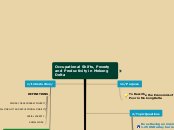Occupational Shifts, Poverty and Productivity in Mekong Delta
1.1/Purpose
To Describe the Economics of Being Poor in Mekong Delta
2/Topic Questions
Does Having an income of lower than 1.25 USD a day barred the poor from moving out of Traditional Agriculture?
Does Occupational Shifts affects Poverty Reduction?
How do we enable Occupational shifts in Mekong Delta even among extremely poor people?
Discuss the Needs for Formal Established Business to give people stable jobs
Data: The lack of number of people involved in formal employed business.
4/ Literature Review: Current Development in Occupational shifts
1/ Credit Constraints, Saving, and Informal Financial Institutions
The Simple of Problem of Savings of Fruit vendors in India
Model of Lending to the Poor
Data in Mekong Delta - Suggest that the poor are less likely to have access to savings, and credits in Mekong Delta
2/ The Entrepreneurship Trap
Data in Mekong Delta - Suggest the Household Business in Mekong Delta's size, investment, and business strategies, technology
Modeling The S-Shaped Curve
"THE ENTREPRENEURSHIP TRAP"
Compare with successful business models learnt in APM college
6/ Empirical Test Strategies
1/ DATABASE
2/ MEASUREMENTS OF SOCIAL ECONOMICS
3/ EVIDENCE STRATEGY
1/Introduction/
DEFINITIONS
PRIMARY OR SECONDARY POVERTY
SOCIAL MOBILITY AND OCCUPATIONAL MOBILITY
SOCIAL POVERTY
SOCIAL WORK
Poverty and Agriculture in Mekong Delta
Why Dealing with Productivity Side of Poor People
Structure of Occupation in Mekong Delta
3/Background: Agriculture Risk Problems
Income Volatility, Consumption and The Poor
Income Volatility of Agriculture in Vietnam
The Dealton Paradox
The Problem of Selling Labor Low
"Selling Labor Low" by Jayachandran
Finding Agricultural Wages in Mekong Delta
Modeling Poverty Trap
5/ How to enable Occupational Shifts?
1/ The Evaluation of Microfinancial Institutions
"The Miracle of Microfinance?" - By Duflo, E.
In Mekong Delta - Suggest that some MFIs' performance in Mekong Delta
2/ Analyze the provision of Stable Jobs
Demand Side
Supply Side
Legend
Data related to Mekong Delta
Poverty and Agriculture in Mekong Delta
Structure of Occupation in Mekong Delta
Income Volatility of Agriculture in Vietnam
Finding Agricultural Wages in Mekong Delta
Data: The lack of number of people involved in formal employed business.
Data in Mekong Delta - Suggest that the poor are less likely to have access to savings, and credits in Mekong Delta
Data in Mekong Delta - Suggest the Household Business in Mekong Delta's size, investment, and business strategies, technology
In Mekong Delta - Suggest that some MFIs' performance in Mekong Delta
CURRENTLY LACKING DATABASE FOR OCCUPATIONAL SHIFT
Theory, Model, And Experiments
The Deaton Paradox
"Selling Labor Low" by Jayachandran
Model of Lending to the Poor
Modeling The S-Shaped Curve
Modeling Poverty Trap
"The Miracle of Microfinance?" - By Duflo, E.
Occupational Choices and Poverty in Mekong Delta - Introduction
Basic Steps in Poverty Reduction
Poverty in Vietnam and Mekong Delta
The importance of Human Capital
Defining Occupational Shifts
Occupational shift is a decision. For example, people decide to form a business, and so on
Occupational Choices and Poverty - Analysis
Why Poverty hinders occupational choices
Risk in low-income household production produces poverty traps and discourage savings
Saving Constraints
Low Return Business "Trap"
Study of Current Interventions for Occupational Choices
Microfinance`s evaluations
Giving out free saving accounts
Question: The effects of poverty on Occupational choices of poor people?
The importance of Human Capital
The process of poverty alleviation, which is the initial stage of development is a two-fold process. The goal of the process is to provide poor peope, now identified as people whose income is less than 1.25 dollars - an unacceptable income rate for survival, the materials so that they can escape their situations.
Natural when we think of poverty, we think of nearly humanitarian crisis where hunger and famine as well as conflict exist. However, that is not the entire story to poverty alleviation. There needs to be some schemes and better knowledge on how to provide poor people the capacity to fight back with uncertainty. As a result of this demands, study of human capital acquisition is importance. One of the most relevant human decision in this realm is the decision to shift occupations.
